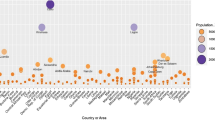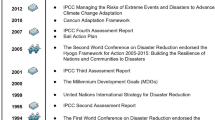Abstract
Strategies to promote synergistic responses to both urban development issues and climate change adaptation have become central to policy advice on adaptation. However, the empirical evidence for the effective utilisation of adaptation synergies in planning practices is insufficient. Taking urban planning in Johannesburg as a case study and using the risks of flooding as an illustrative example, this qualitative study explores how adaptation synergies can be realised in planning practices. In this specific case, significant synergy possibilities in planning practices are not observed. Instead, political challenges of reconciling adaptation measures with planning responses to the considerable developmental challenges of urban divide and multiple urban risks in Johannesburg substantially limit the response space for adaptation practices, including those achievable through synergies. Insights gained in this study underline the necessity of giving greater attention to the empirics of observed synergies. The study provides initial indications that it may be necessary to adjust elements of the conceptual arguments concerning adaptation synergies and related policy advice.
Similar content being viewed by others
Notes
Consequently, South African slums, for instance, are being interpreted as a phenomenon that is here to stay (Huchzermeyer 2011).
The ‘gravel roads programme’ is being implemented in seven townships in Johannesburg. In the 2013/2014 budget year, it received a share of 22.5 % of JRA’s capital budget (JRA 2013: 56).
Providing formal shelter for informal dwellers is a legitimate planning response to reduce exposure to environmental risks of climate change, including flooding (Satterthwaite et al. 2009). However, this is certainly not a sustainable response if these houses itself are placed in flood retaining wetlands or in areas of insufficient stormwater drainage capacities. In Johannesburg, insufficient drainage capacity and inappropriately located give-away houses are a reason for frequent flood damages (planner M—2013).
References
Adger WN, Huq S, Brown K et al (2003) Adaptation to climate change in the developing world. Progr Dev Stud 3(3):179–195
Adger W, Dessai S, Goulden M et al (2009) Are there social limits to adaptation to climate change? Clim Change 93:335–354
Bai X (2007) Integrating global environmental concerns into urban management. The scale and readiness arguments. J Ind Ecol 11(2):15–29
Belkin A, Blight J (1991) Triangular mutual security: why the Cuban missile crisis matters in a world beyond the cold war. Polit Psychol 12(4):727–745
Bicknell J, Dodman D, Satterthwaite D (eds) (2009) Adapting cities to climate change. Understanding and addressing the development challenges. Earthscan, London
Biesbroek GR, Klostermann JEM, Termeer CJAM, Kabat P (2013) On the nature of barriers to climate change adaptation. Reg Environ Change 13(5):1119–1129
Birkmann J (2011) First- and second-order adaptation to natural hazards and extreme events in the context of climate change. Nat Hazards 58(2):811–840
Birkmann J, Fleischhauer M (2009) Anpassungsstrategien der Raumentwicklung an den Klimawandel: “Climate Proofing”. Raumforschung und Raumordnung 2:114–127
Bulkeley H (2010) Cities and the governing of climate change. Annu Rev Environ Resour 35(1):229–253
Carpenter SR, Brock WA (2008) Adaptive capacity and traps. E&S 13(2). http://www.ecologyandsociety.org/vol13/iss2/art40/
Dupuis J, Knoepfel P (2011) Les barrières à la mise en œuvre des politiques d’adaptation au changement climatique: le cas de la Suisse. Swiss Pol Sci Rev 17(2):188–219
Dupuis J, Knoepfel P (2013) The adaptation policy paradox: the implementation deficit of policies framed as climate change adaptation. E&S 18(4):31. doi:10.5751/ES-05965-180431
Eisenack K, Moser SC, Hoffmann E et al (2014) Explaining and overcoming barriers to climate change adaptation. Nat Clim Change 4(10):867–872
Fankhauser S, McDermott TKJ (2014) Understanding the adaptation deficit: why are poor countries more vulnerable to climate events than rich countries? Glob Environ Change 27:9–18
Fürst D (2008) Planung in bürokratischen Organisationen. In: Fürst D (ed) Handbuch Theorien und Methoden der Raum- und Umweltplanung. Dortmund, Rohn, pp 133–160
Haase D, Schwarz N, Strohbach M et al (2012) Synergies, trade-offs, and losses of ecosystem services in urban regions. E&S 17(3):22. doi:10.5751/ES-04853-170322
Häußermann H, Läpple D, Siebel W (2008) Stadtpolitik. Frankfurt a.M, Suhrkamp
Hetz K, Bruns A (2014) Urban planning lock-in: implications for the realization of adaptive options towards climate change risks. Water Intern 39(6):884–900
Holling CS (2001) Understanding the complexity of economic, ecological, and social systems. Ecosystems 4:390–405
Howe C, Suich H, Vira B, Mace GM (2014) Creating win-wins from trade-offs? Ecosystem services for human well-being: a meta-analysis of ecosystem service trade-offs and synergies in the real world. Glob Environ Change 28:263–275
Huchzermeyer M (2011) Cities with slums. From informal settlement eradication to a right to the city in Africa. UCT Press, Cape Town
Huq S, Reid H (2004) Mainstreaming adaptation in development. Inst Dev Stud Bull 35:15–21
Hurlimann AC, March AP (2012) The role of spatial planning in adapting to climate change. Clim Change 3(5):477–488
Hutter G (2007) Strategic planning for long-term flood risk management. Intern Plan Stud 12(3):273–289
IPCC (2014) Climate change 2014: impacts, adaptation, and vulnerability. Part A: global and sectoral aspects. In: Field CB, VR Barros, DJ Dokken, KJ Mach, MD Mastrandrea, TE Bilir, M Chatterjee, KL Ebi, YO Estrada, RC Genova, B Girma, ES Kissel, AN Levy, S MacCracken, PR Mastrandrea, LL White (eds) Contribution of working group II to the fifth assessment report of the intergovernmental panel on climate change. Cambridge University Press, Cambridge, 1132 pp
Kates RW, Travis WR, Wilbanks TJ (2012) Transformational adaptation when incremental adaptations to climate change are insufficient. PNAS 109(19):7156–7161
Klein RJT, Schipper ELF, Dessai S (2005) Integrating mitigation and adaptation into climate and development policy: three research questions. Environ Sci Policy 8:579–588
Macintosh A, Foerster A, McDonald J (2015) Policy design, spatial planning and climate change adaptation: a case study from Australia. JEPM 58(8):1432–1453
Millennium Ecosystem Assessment (MA) (2005) Ecosystems and human wellbeing: wetlands and water. Island Press, Washington
Moser SC, Ekstrom JA (2010) A framework to diagnose barriers to climate change adaptation. Proc Natl Acad Sci 107(51):22026–22031
Murray M (2011) City of extremes. The spatial politics of Johannesburg. Wits University Press, Johannesburg
Parnell S, Simon D, Vogel C (2007) Global environmental change: conceptualising the growing challenge for cities in poor countries. Area 39(3):357–369
Pasquini L, Cowling RM, Ziervogel G (2013) Facing the heat: barriers to mainstreaming climate change adaptation in local government in the Western Cape Province, South Africa. Habitat Int 40:225–232
Pelling M (2011) Adaptation to climate change: from resilience to transformation. Routledge, London
Picketts IM, Déry SJ, Curry JA (2014) Incorporating climate change adaptation into local plans. JEPM 57(7):984–1002
Revi A, Satterthwaite D, Aragon-Durand F et al (2014) Towards transformative adaptation in cities: the IPCC’s fifth assessment. Environ Urban 26(1):11–28
Reyer C, Bachinger J, Bloch R et al (2012) Climate change adaptation and sustainable regional development: a case study for the Federal State of Brandenburg, Germany. Reg Environ Change 12(3):523–542
Roberts D (2008) Thinking globally, acting locally: institutionalising climate change at the local government Level in Durban, South Africa. Environ Urban 20(2):521–537
Roberts D (2010) Prioritizing climate change adaptation and local level resilience in Durban, South Africa. Environ Urban 22(2):397–413
Satterthwaite D, Huq S, Reid H et al (2009) Adapting to climate change in urban areas: the possibilities and constrains in low- and middle income nations. In: Bicknell J, Dodman D, Satterthwaite D (eds) Adapting cities to climate change. Earthscan, London, pp 3–51
Schipper L (2007) Climate change adaptation and development: exploring the linkages. Tyndall Centre for Climate Change Research. Working paper 107
Sharma D, Kansal A (2013) Sustainable city: a case study of stormwater management in economically developed urban catchments. In: Luo Z (ed) Mechanism design for sustainability. Springer, Dordrecht, pp 243–263
Sharma D, Tomar S (2010) Mainstreaming climate change adaptation in Indian cities. Environ Urban 22(2):451–465
Smit B, Pilifosova O (2001) Adaptation to climate change in the context of sustainable development and equity. In: McCarthy JJ, Canziani O, Leary NA, Dokken DJ, White KS (eds) Climate Change 2001: Impacts, Adaptation and Vulnerability. IPCC Working Group II. Cambridge University Press, Cambridge, pp 877–912
Tol RSJ (2005) Adaptation and mitigation: trade-offs in substance and methods. Environ Sci Policy 8(6):572–578
Tompkins EL, Adger NW (2003) Building resilience to climate change through adaptive management of natural resources. Tyndall Centre for Climate Change Research. Working paper 27
Uittenbroek C, Janssen-Jansen LB, Runhaar HAC (2013) Mainstreaming climate adaptation into urban planning: overcoming barriers, seizing opportunities and evaluating results in two Dutch case studies. Reg Environ Change 13:399–411
UN-Habitat (2010) State of the world’s cities 2010/2011. Bridging the urban divide. Earthscan, London
Wilson E, Piper J (2010) Spatial planning and climate change. Routledge, New York
Yin R (2009) Case study research. Sage, London
Ziervogel G, Parnell S (2014) Tackling barriers to climate change adaptation in South African coastal cities. In: Smith GP, Glavovic BC (eds) Adapting to climate change: lessons from natural hazard planning. Springer, Dordrecht, pp 57–73
Ziervogel G, Shale M, Du M (2010) Climate change adaptation in a developing country context: the case of urban water supply in Cape Town. Clim Dev 2(2):94–110
Acknowledgments
This research has been partly funded by the German Federal Ministry of Education and Research (BMBF) under the funding reference number 01 LN 1316 A. I like to thank Antje Bruns and Philip Harrison as well as two anonymous reviewers for their helpful comments and suggestions.
Author information
Authors and Affiliations
Corresponding author
Additional information
Handling Editor: Jamie Pittock.
Parts of the research were conducted during membership in the Dresden Leibniz Graduate School.
Electronic supplementary material
Below is the link to the electronic supplementary material.
Rights and permissions
About this article
Cite this article
Hetz, K. Contesting adaptation synergies: political realities in reconciling climate change adaptation with urban development in Johannesburg, South Africa. Reg Environ Change 16, 1171–1182 (2016). https://doi.org/10.1007/s10113-015-0840-z
Received:
Accepted:
Published:
Issue Date:
DOI: https://doi.org/10.1007/s10113-015-0840-z




